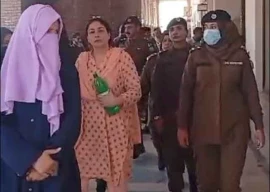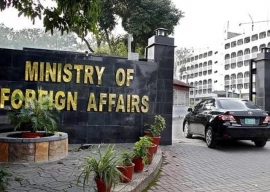
While a lacklustre response during a joint session of parliament was a good indicator of where the process stood, the true idleness on the issue came to the fore when a session of the Parliamentary Committee on National Security (PCNS) convened with most of the major parties missing.
Monday’s session, called by PCNS chairman Senator Raza Rabbani, was not attended by the Pakistan Muslim League-Nawaz (PML-N), the Jamiat Ulema-i-Islam-Fazl (JUI-F) or even by the Pakistan Muslim League-Quaid (PML-Q).
Though PML-N and PML-Q’s absence was attributed to the National Energy Conference being held in Lahore, the failure of any of their leaders to attend did raise some eyebrows.
JUI-F, on the other hand, seemed to be sticking to its guns on its decision to boycott the committee’s proceedings.
During proceedings, Senator Rabbani requested the JUI-F chief to end the boycott, despite his opposition to reopening Nato supply routes.
“Maulana sahib should have come to the proceedings. To evolve consensus, it’s compulsory to keep sharing reservations and grievances,” Rabbani told the media outside the Parliament House in Islamabad.
He went on to add that there could be headway in Tuesday’s session if the PML-N and the JUI-F participated.
Joint session proceedings
Similar to previous joint sessions, MPs found plenty of other topics to debate. The law and order situation in Gilgit-Baltistan, NGO representatives harassing the JUI-F chief, the killing of nine PPP workers in Karachi and the Siachen tragedy were among the issues discussed through point of orders during the joint session.
The debate over the major foreign policy review, however, only attracted members of the ruling Pakistan Peoples Party (PPP) and its coalition partners in a session that had the leader of the house, Prime Minister Gilani, Leader of the Opposition in the National Assembly Chaudhry Nisar and Leader of the Opposition in the Senate Ishaq Dar missing.
A frustrated PPP leader, Nadeem Afzal Gondal, urged the leaders of major political parties to speak the truth to the nation instead of politicking over relations between Pakistan and the US.
“Why are we shying away from the opportunity to define the country’s foreign policy?” Gondal said in a veiled attack on the opposition’s decision to remain absent from the debate.
Meanwhile, the Awami National Party (ANP)’s Afrasiab Khattak urged Parliament to stand against all odds, shun the concept of the military state and move towards being a welfare state, as envisioned by the founding fathers.
“Our flawed Afghan policy is the reason for many of our problems,” Khattak said, adding that Pakistan “should stop treating Afghanistan as our fifth province.”
Lamenting on the crisis in Balochistan, Advocate Usman Khan, an independent MNA from Balochistan, underlined the need for Balochistan to be given a role in policy making, adding that the country’s policies only originated from the people of Punjab.
Later, JUI-F chief Maulana Fazalur Rehman urged National Assembly Speaker Dr Fehmida Mirza to address the law and order situation in Gilgit-Baltistan.
Referring to a special committee headed by PPP’s Syed Khursheed Shah, constituted after violence erupted in Karachi and Balochistan last year, Rehman said that the committee had failed to deliver any justice.
Meanwhile, Haider Abbas Rizvi of the Muttahida Qaumi Movement (MQM) said that recent incidents of violence were the result of a conspiracy being hatched by certain foreign elements who wish to make Pakistan into yet another battleground, similar to Afghanistan.
Responding to concerns raised by the MPs, Interior Minister Rehman Malik said, “We as a nation are not doing the job which we ought to,” referring to an excessive delay in the passage of anti-terrorism laws.
The minister told the sitting that he, along with a delegation of religious leaders from Shia and Sunni communities, would visit G-B to help bring the situation under control.
In addition, the minister once again urged the speaker to allow him to give an in-camera briefing to the house about foreign elements working against the country.
“I will not leave this place unless you are satisfied,” Malik added.
(Read: Parliament and national security)
Published in The Express Tribune, April 10th, 2012.
COMMENTS (3)
Comments are moderated and generally will be posted if they are on-topic and not abusive.
For more information, please see our Comments FAQ











































Has Pakistan ever done anything on a timely and responsible basis?
Politicians are self-serving. We know that but it takes a few great men to change the destiny of societies. Those in our Parliament are certainly not made of sterner stuff (ala Shakespeare). Just reading the proceedings in Parliament today, first made me puke, and then I recalled having had a sparkier discussion with habitual delinquents at the corner Pan Shop, as compared to these Johnnies trying to chart our foreign policy!!!!!
Is anyone surprised at the absenteeism? When the Prime Minister himself does not attend - why raise eyebrows at lack of attendance of opposition MPs and senators?
Basically no-one wants to alienate Pakistani public by opening the supply route EVEN if it is in the national interest. Equally no-one wants to alienate USA by voting against opening the route (JUI- F being an exception).